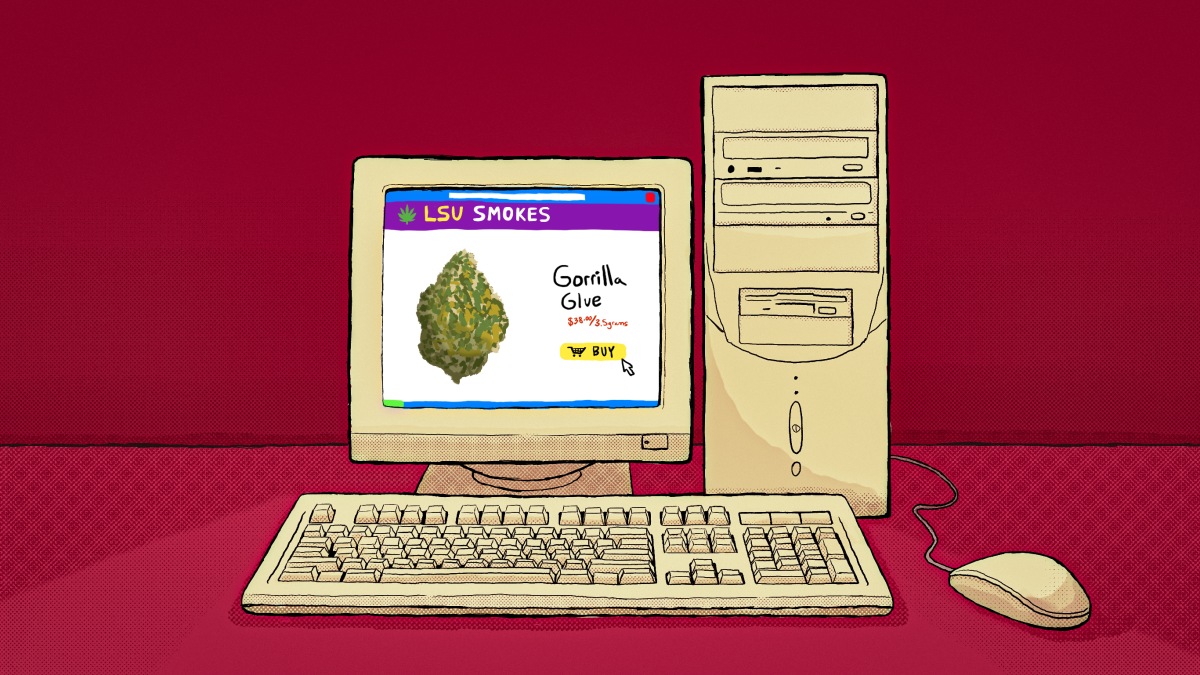LSU’s partnership with a California cannabis education company has helped the university reach hundreds of students seeking training in medical marijuana, yet Louisiana’s cannabis industry still faces challenges and uncertainties.
In January 2022, Louisiana legalized possession of up to 2.5 ounces of raw smokable medical marijuana for those with a medical marijuana card. Green Flower, a California cannabis education company, launched its partnership with LSU in late 2022.
“LSU and Green Flower recognize the industry’s growth in Louisiana and nationally,” said Kristy Anthony, director of professional development for LSU Online, via email.
Green Flower launched its first higher-ed partner programs in 2020 after noticing cannabis companies were hiring exponentially but struggled to find candidates with industry-specific experience or knowledge. Green Flower desires to provide the best education possible and train a competent, passionate and knowledgeable future cannabis workforce, Anthony said.
Since the program launched at LSU, 580 students have signed up for the cannabis training courses and the completion rate is 85%, Anthony said.
Green Flower now works with 54 U.S. university and community college partners, Anthony said.
“Each course contains reading and video lessons compiled from a network of over 700 experts in the cannabis industry – physicians, researchers, attorneys, CEOs and entrepreneurs, etc. all provided insights into the industry and their subject areas,” Anthony said.
Courses include Cannabis Healthcare and Medicine, Cannabis Agriculture and Horticulture, The Business of Cannabis, Cannabis Compliance and Risk Management and Cannabis Product Development and Design. Each course takes six months to complete and is instructor-led and asynchronous.
“Each week includes an overview of what students will learn, several video lectures and lessons, assignment skills checks, and discussion opportunities,” Anthony said. “Assignments include one that builds into a cumulative portfolio for students to demonstrate what they learned at completion.”
Cannabis Compliance and Risk Management uses a cross-disciplinary approach to key industry sectors, Anthony said.
“This program will prepare you to become an in-demand compliance professional within this fast-evolving cannabis industry. You will gain an understanding of the risks related to operating a commercial cannabis business and learn how to mitigate them with a proven Cannabis Risk Management Framework,” Anthony said.
David Bocage, associate director and academic coach at Southern University at New Orleans, received his certification in Cannabis Compliance and Risk Management.
Bocage said the course taught him how the marijuana plant evolved, how other countries and civilizations embrace the marijuana plant for medicinal purposes and a breakdown of the chemical elements and components of the marijuana plant itself.
“I spent probably about five hours a week working on the course,” Bocage said. “You typically complete a module, or a discussion topic, accompanied with a quiz. Sometimes I would take a final exam after a series of modules have been completed. It’s comprehensive in that case.”
In Louisiana, the cannabis industry is expected to grow 250% between 2018 and 2028. Louisiana anticipates over $400 million in legal cannabis sales by 2025.
Despite progress in Louisiana’s cannabis industry, professionals in the field still hold concerns about job availability and roadblocks in the state.
Brennan Ruppert, an LSU graduate student with a master’s in cannabis sativa cultivation practices and production systems, said he doesn’t plan on pursuing employment in Louisiana. Ruppert said he has little hope that the cannabis field will grow exponentially in Louisiana.
“I think the evolution of the products in the state has grown tremendously since the legalization of medical cannabis in Louisiana. However, I feel like medical cannabis is too expensive for many customers to afford,” Ruppert said.
Ruppert said he believes the industry will struggle to grow.
“Louisiana will require substantial time to reach the maturity level of the first legalized states, due to Louisiana not being a conducive environment for outdoor cultivation of cannabis, as well as the role politics play in the state as well,” said Ruppert.
Ryan Stoa, a cannabis law scholar and professor at Southern University Law Center, said Louisiana’s challenges in the cannabis industry can be attributed to two main factors: the state’s underdeveloped medical marijuana market and price volatility within the industry.
“The state isn’t exactly throwing itself into the legal cannabis space. [Louisiana] has a very limited number of licenses to cultivate, to transport, process, distribute, and so on,” Stoa said.
As for price volatility, Stoa said that despite the high expectations of wealth, few cannabis businesses nationwide are making a large profit.
Bocage said he felt hopeful his certification in Cannabis Compliance and Risk Management would create job opportunities. He said he signed up to receive job opportunities after completing the course and has only received one since completing it in January 2024.
“I thought that it would open up doors immediately,” Bocage said.
Bocage said he understands Louisiana’s cannabis industry is in its beginning stages and part of his anticipation was far-fetched.
He still recommended the courses to others.
“Really take advantage of it if you can afford it and have the time to go through with it,” Bocage said.
Despite the challenges the cannabis industry faces, Stoa said he sees a future where progress in the industry is possible.
There is support for recreational legalization in Louisiana in terms of public polling, Stoa said.
“We could see recreational legalization in the next five years or so in Louisiana,” Stoa said. “It certainly wouldn’t shock me.”
Anthony said she believes the success of LSU’s cannabis courses demonstrates the market demand for this emerging industry.
LSU’s online cannabis education program sees success following state-wide legalizations
June 11, 2024
Weed Computer Graphic







